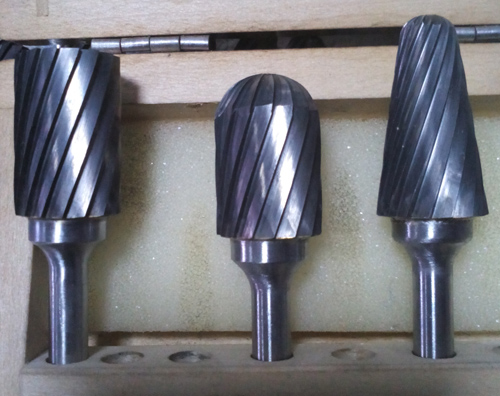Carbide Burrs for steel
Burr Shape Selection
Select the shape which conforms to your workpiece. Maximise the area of contact between the tool and material. Having more of the cutting edge engaged in the material will improve the part finish.
Cutting Style Selection
the choice of flute cut style is dependant on the type of material being machined, the amount of stock removal, and the finish required. In general, the harder the material being machined, the finer the cut should be.
Standard Cut
Also referred to as plain cut, is most commonly used for general purpose deburring of steel, cast iron and other ferrous materials.

Double Cut
Also referred to as alternate diamond cut, ideal where greater tool control is important. Very efficent stock removal. Creates a small chip.

Chipbreaker
To provide break down in chips. Chip size will be smaller than plain cut.

Diamond Cut
For use on heat treated and tough alloy steels. Creates a powder- like chip. Gives a fine finish with excellent tool control but tool life is short.

Coarse Cut

The most common types of burrs are single carbide burrs for steel, which remove the most amount of material. The drawback to using single cut carbide burs is that they leave a rather rough finish. Single cut carbide burs are commonly used when working with cast iron, steel, copper, brass, and other ferrous materials.
Double cut carbide burs carbide burrs for steel can be used at slower speeds, and produce smaller chips. They remove harder material more rapidly than single cut burs, and offer more operator control. Depending upon the shape and size of the bur you choose, some will leave a very smooth surface on your material, while others will leave a less smooth surface but might remove more material.
As a general rule, finer work that calls for smoother surfaces, like cutting diamonds, or dentistry, calls for smaller burs. If you are working with larger pieces of material, and it’s more important to remove the most material in the quickest time possible, a larger bur is called for.
